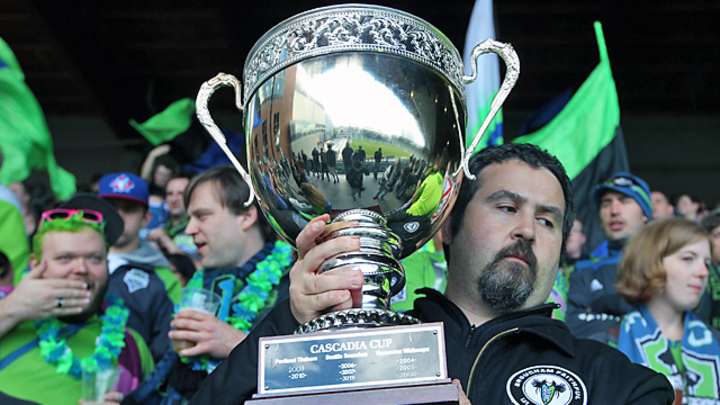Supporters, MLS clash over 'Cascadia Cup'


PORTLAND, Ore. (AP) -- The Cascadia Cup, created in 2004 by soccer supporters to celebrate the rich rivalry between clubs in Seattle, Portland and Vancouver, is now the unexpected center of a conflict between those groups and Major League Soccer.
It started when MLS intended to trademark the term "Cascadia Cup'' in the United States and Canada - prompting outrage from the fans who named the yearly head-to-head competition between the Sounders, Whitecaps and Timbers, and gave it a stately silver trophy.
MLS claims it wants to protect the Cascadia Cup from outsiders looking to exploit it. The supporters fear that MLS itself will be exploiting the term.
The issue has Seattle's Emerald City Supporters, Portland's Timbers Army and Vancouver's Southsiders banding together -- something that on the surface appears a bit unusual given the competitive passion of the rivalry.
The groups have formed the Cascadia Cup Council to protect the rivalry's name. And its spirit.
"Not only does the Cascadia Cup Council believe they rightfully own the trademark to Cascadia Cup but they also are of the belief they are the appropriate entity to protect the mark from third parties that are unaffiliated with the supporters groups in the Pacific Northwest,'' the group said in announcing its formation.
The council has already submitted its own application to trademark "Cascadia Cup'' with the U.S. Patent and Trademark Office. The application was filed on Jan. 8.
To his credit, MLS Commissioner Don Garber said he should have better communicated the league's intentions with the supporters' groups. MLS has not yet applied for the U.S. trademark, but has applied for the equivalent in Canada.
Obviously, the issue is touchy for the teams themselves.
"I've tried to keep an ear to it and not get into the middle of it very much. I understand both sides of the issue. And I'm confident that something reasonable, that cooler minds, cooler heads will prevail and they will work something out,'' said Sounders owner and general manager Adrian Hanauer. "But that's about as controversial as I'm willing to get right now.''
The Cascadia Cup -- at least the trophy itself -- was introduced in 2004 when all three teams were part of the United Soccer Leagues First Division. Fans pooled their money to buy the 2-foot tall silver cup, which goes to the team that finishes with the best record in head-to-head matches between the three, based on a points system.
But the actual rivalry between the three teams dates back to 1975, when all of them were part of the North American Soccer League.
Seattle supporters like to point out that the Sounders beat Portland 1-0 in the first game between the two teams that year, while Timbers fans talk up how Portland beat Seattle in the playoffs and advanced to the league championship.
Since 2004, each of the teams has claimed the Cascadia Cup three times. The rivalry grabbed attention on a national scale when the Timbers and Whitecaps joined the Sounders in MLS in 2011. The Timbers are the reigning Cascadia Cup champions.
This is not the first time that an issue involving a rivalry and supporters groups has become contentious.
Last season, controversy erupted surrounding the Rocky Mountain Cup between the Colorado Rapids and Real Salt Lake. Shortly before the April match between the teams, the rivalry was described as "presented by Mark Miller Subaru'' on team websites. Supporters for both teams expressed outrage that the fan-created derby suddenly had a corporate sponsor - without their input. The teams later admitted the sponsorship deal should have been handled differently.
The MLS has already applied to trademark other rivalries, including the Rocky Mountain Cup, the Brimstone Cup between the Chicago Fire and FC Dallas, and the California Clasico between the San Jose Earthquakes and the L.A. Galaxy.
Following the MLS SuperDraft earlier this year, Garber addressed the controversy. From a business standpoint, it's understandable that MLS wants to make sure that anything involving its teams is kept in-house.
"(MLS can) ensure that it's controlled. Prospective fan groups, in theory, could offer that trademark to a competitive sponsor,'' Garber said at the time. "They can take that trademark and sell it to a promoter. They can produce merchandise that's not merchandise that we would want associated with our teams or with our league.''
The Cascadia Cup Council and MLS officials aired their concerns in a meeting earlier this week, which both sides said was productive.
"This week we had a constructive conversation with supporters of all three clubs involved in Cascadia Cup, and we look forward to continuing that dialogue in the weeks ahead,'' MLS President Mark Abbott said.
In other words, stay tuned.
